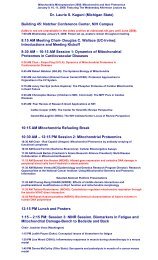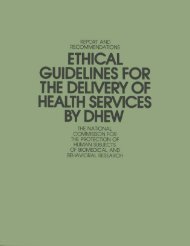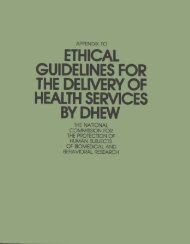RESEARCH ON THE FETUS - National Institutes of Health
RESEARCH ON THE FETUS - National Institutes of Health
RESEARCH ON THE FETUS - National Institutes of Health
You also want an ePaper? Increase the reach of your titles
YUMPU automatically turns print PDFs into web optimized ePapers that Google loves.
19. Leroy A. Jackson, M.D. (Obstetrician in private practice, Washington,<br />
D.C.). Dr. Jackson cited procedures derived from research on the fetus that have<br />
improved his ability as a physician to provide medical care to his patients. He<br />
focused his testimony on the need to assure that consent from the mother for<br />
research on the fetus is truly informed consent, and that minorities and other<br />
groups do not bear a disproportionate share <strong>of</strong> the research burden. To these<br />
ends, he urged that research review committees contain members racially representative<br />
<strong>of</strong> and capable <strong>of</strong> communicating adequately with individuals on whom<br />
the research is conducted, that consent form wording be reviewed in detail, and<br />
that non-Government research agencies follow Government guidelines.<br />
20. Karen Mulhauser (<strong>National</strong> Abortion Rights Action League). Ms. Mulhauser<br />
urged that the Commission recommend no limitations on research on the<br />
nonviable fetus in utero, provided informed consent is received from the pregnant<br />
woman. She also opposed any limitation <strong>of</strong> research to develop improved<br />
and safer abortion techniques.<br />
21. Ernest L. Hopkins, M.D. (Pr<strong>of</strong>essor <strong>of</strong> Obstetrics and Gynecology,<br />
Howard University). Dr. Hopkins cited statistics indicating that black infants<br />
and mothers have markedly higher morbidity and mortality in childbirth and the<br />
first year <strong>of</strong> life than do whites, and thus have a significant stake in research<br />
directed toward pregnancy and infancy. It is essential that research be conducted,<br />
he stated, as well as mandatory that the rights <strong>of</strong> the subject be protected.<br />
He advised the Commission that a mother <strong>of</strong>ten arrives at a decision to<br />
terminate pregnancy because she cannot support her present family. These are<br />
honorable women with wisdom, he said. They are very emotionally involved with<br />
the pregnancy, but they know the birth <strong>of</strong> a baby would be catastrophic. They<br />
decide, reluctantly, to have an abortion because they see no alternative.<br />
22. J. V. Klavins, Ph.D. (Pr<strong>of</strong>essor <strong>of</strong> Pathology, State University <strong>of</strong><br />
New York at Stony Brook). Dr. Klavins suggested that research on the fetus could<br />
be conducted with consent <strong>of</strong> the mother (and father when available). Since abortion<br />
is legal, he argued, research that causes no harm or suffering to the fetusto-be-aborted<br />
is certainly acceptable. He stated that research on the human<br />
47











